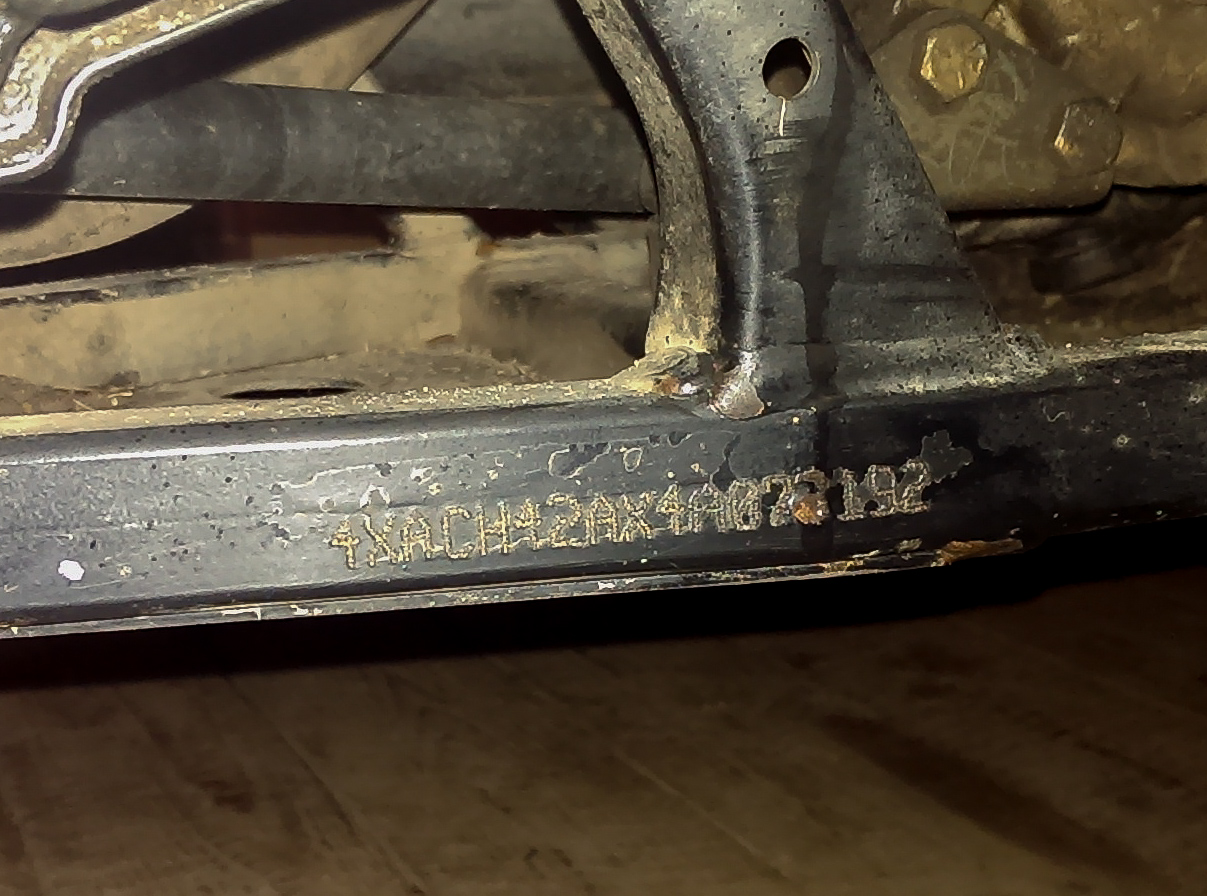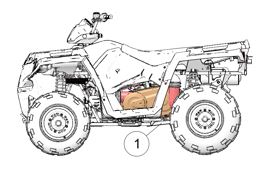Polaris PWC Knowledge > First things to doURL link to this web page > First things to do Welcome to the world of Polaris PWC ownership!Polaris Personal Water Craft production started with the 1992 SL650, and Polaris stopped making PWC near the end of 2004. However, these machines are still fun, fast, and maintainable. You just need to learn what it takes to get them running properly, and keep them running. Polaris Industries is still in business, and parts are generally still available.
As with every 2-stroke watercraft engine, you must make sure everything is correct before you start riding.
Note: If you have a 2004 MSX 110 or MSX 150 4-stroke Weber engined Polaris, click here.
If you simply get on and ride (even just to 'water test it') without first making sure things are as they should be, you run the risk of significant engine damage. Even a few minutes of riding can cause damage if certain things are not as they should be.
If you have purchased a Polaris PWC that is not in running condition, often enough the reason it is broken is that the previous owner was riding it without properly taking care of it.
The most important thing is to educate yourself about how these machines work, and what you must do to keep them in good operating condition. You will find support, information and advice among the Polaris PWC community, especially at www.Greenhulk.net
Basic Introduction to the purchase of a Personal WatercraftThis is not specific to Polaris PWC, and some things may not directly apply.
It is written for PWC with carburetor 2-stroke engines.How to check compression on a 2-stroke engine
Get your Polaris PWC running properly and keep it on the water >Click here
Polaris PWC model overview
Polaris made several distinct generations of PWC. Starting in 1992, the first few years were powered by 3 cylinder Fuji 'blue' engines.
Polaris then migrated to a US manufactured 'red domestic' engine design, starting in 1996, and appearing in more models in 1997 and 1998 (two and three cylinder versions).
In 1999, Polaris introduced the 2-stroke Ficht direct fuel injection (FFI) domestic engine in the new four person Genesis i model, while continuing to sell carburetor models.
Additional fuel injected 2-stroke Virage i (two cylinder) and Virage TXi models appeared in 2001 and 2002, and the MSX 140 arrived in 2003.
The one person Polaris Octane stand-up model was originally sold only for racing (2002-2004).
Click here for information specific to the Fuji engined Polaris PWC (1992-1997)
These have engine sizes of 650, 750, and 780cc, and the engines are normally painted blue.
Click here for information related to the newer generation models (Virage, Genesis, MSX 140) 1999-2004
Click here for information specific to the Polaris domestic engined PWC (1996-2004)
These engines are typically painted red. The 2003-2004 engines were sometimes black.
Click here for information related to the Ficht fuel injected 2-stroke models (1999-2004)
Genesis FFI, Genesis i, Virage i and Virage TXi, MSX 140
Click here for information specific to the Polaris Pro 785 'race' model (1997-2000)
This model has a specially tuned version of the Fuji engine, and has many differences from the other Fuji engined Polaris.
It also differs from the Pro 1200 model.
Click here for information specific to the Polaris Octane 'Stand-up' model (2002-2004)
If you are fortunate enough to have a rare Polaris Matrix (MSX 140 with carburetors and triple exhaust pipe conversion) click here.
Hull Identification Number
Before you you pay, always check that the HIN number plate is present on the rear deck of any PWC you intend to purchase, and that it has not been tampered with.
There should be a second copy of the HIN number plate mounted somewhere inside the hull. Exact location varies, and it may be hidden underneath the battery, engine or fuel tank, or tucked up in the front somewhere. Both HIN plates should show the same number.
It is illegal to change the HIN number plate or move it to a different hull.
How to decode the HIN number plate on the rear deck
For Polaris, the first three letters are always PLE followed by a five digit serial number and a date code
.
The last four digits on the HIN plate indicate the model year, and the month and year it was manufactured.
The very last two HIN digits are the model year
The two digits before that are the month (one letter, see below) and year (single digit) of actual production.
| A | January | | B | February | | C | March | | D | April | | E | May | | F | June | | G | July | | H | August | | I | September | | J | October | | K | November | | L | December |
Example - PLE12345K203
The last two digits are 03, indicating this is a 2003 model.
The previous two digits are K2 indicating it was actually manufactured in November (K) of 2002
Example - PLE543213A93 = 1993 model, made in January (A) of 1993
Engine serial number
The actual engine serial number is embossed into the side of the crank case.
On Fuji engines the serial number is behind the starter motor on the left side of the engine, and usually hidden by the exhaust manifold and pipe. There may also be a sticker on top of the water manifold bar.
On domestic engines there is a sticker on the magneto housing near the starter motor.
Do not confuse the engine model code with the engine serial number.
Engine model codes
For Fuji engines, the model code may look something like EC78PWE-02 or EC65PW.
EC = Fuji engine
78 = 780cc
PW = Polaris Watercraft ?
E-xx = engine version or revision code
Polaris blue Fuji engine model codes
EC65PW = 650cc
EC75PW = 750cc
EC78PW = 780cc
EC78PWE = 780cc
EC78ZPWE01 = 785cc (Pro 785)
Polaris red domestic engine codes
WC70DCSP = 700cc
WC70SCSP = 700cc
W77-DCSP-02A = 777cc (Octane stand-up, 2003 w/regular flywheel)
WC90TCSP = 900cc
WC105TCSP = 1050cc
W120-TCSP = 1165cc (red 1200)
Ficht Direct Fuel Injected (DFI)
W77-DFI = 777cc (Virage i '800')
W120-DFI = 1165cc (red '1200')
W12HO-DFI = 1192cc (black MSX 140 '1200')
|
Subpages (14):Fuji engined Polaris PWC (1992-1997)Keeping your Polaris PWC on the waterMore Polaris PWC related InfoMSX 110 and MSX 150 (2004) with Weber turbo-charged MPE750 enginePolaris domestic engined PWC (1996-2004)Polaris Ficht engined PWCPolaris MatrixPolaris OctanePolaris Pro 785 (1997-2000)Polaris PWC related informationPolaris Virage-Genesis-MSXPWC purchase infoPWC Riding equipment and safetyTrailering |
The Sportsman model was introduced in 1995 and now the name encompasses much of the line of Polaris four-wheel ATV’s with many different models and options. The Polaris Sportsman uses the 17-character standard VIN format. The VIN is often required to obtain proper replacement parts from suppliers.
Polaris Vin Number Location
The 10th digit in a 17 digit V.I.N. or frame number represents the year of your ATV, motorcycle, or car.
A = 1980 B = 1981 C = 1982 D = 1983 E = 1984 F = 1985 G = 1986 H = 1987
J = 1988 K = 1989 L = 1990 M = 1991 N = 1992 P = 1993 R = 1994 S = 1995
T = 1996 V = 1997 W = 1998 X = 1999 Y = 2000 1 = 2001 2 = 2002 3 = 2003
4 = 2004 5 = 2005 6 = 2006 7 = 2007 8 = 2008 9 = 2009 A=2010
Polaris Serial Numbers Year Date

Cars and trucks use the same codes.
The frame numbers on 4-wheelers can usually be found on the lower left frame rail. Some Suzuki ATV frame numbers are located on the rear frame rail. Some newer Honda ATV frame numbers are located in the front, on a flat plate behind the bumper. Most dirt bike frame numbers are on the steering neck below the handlebars.

Polaris Engine Serial Number Lookup
